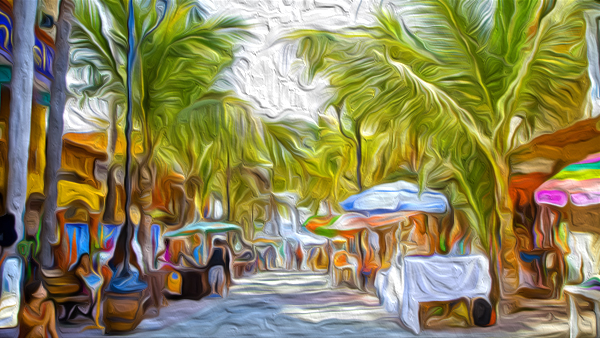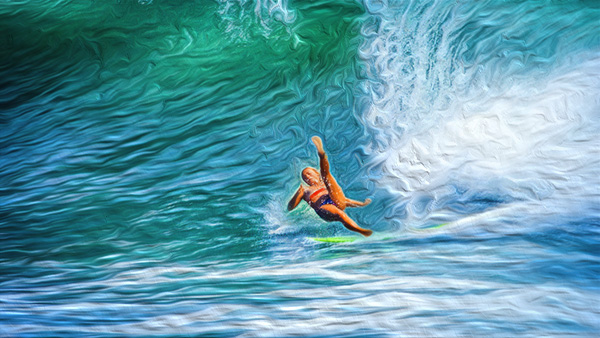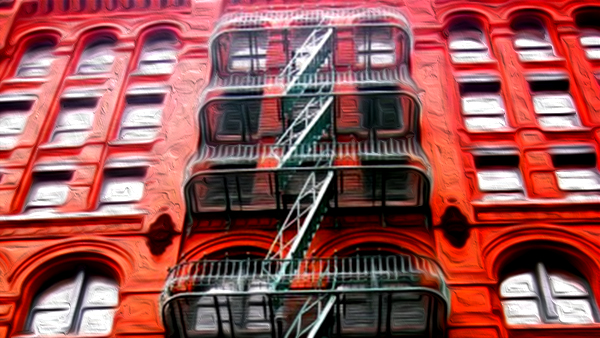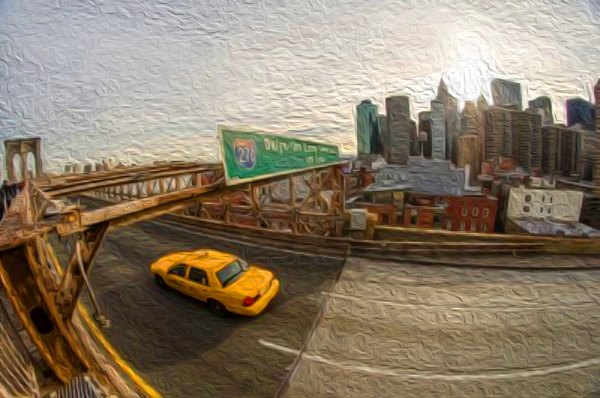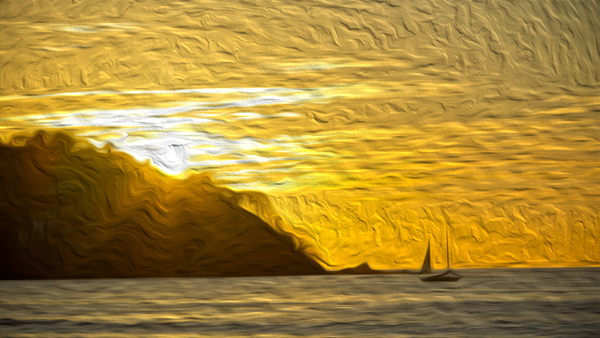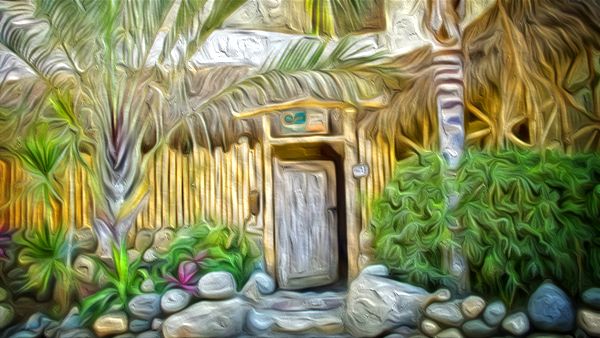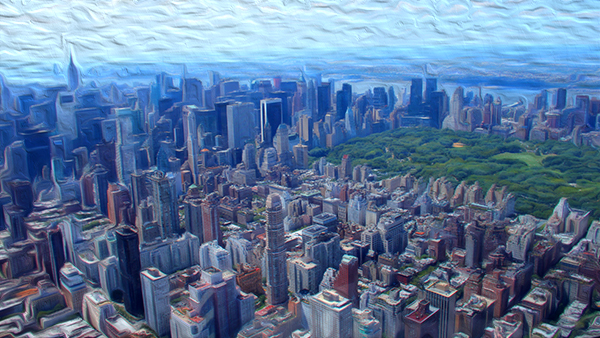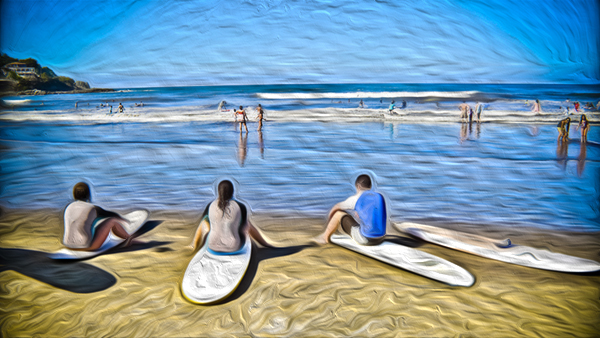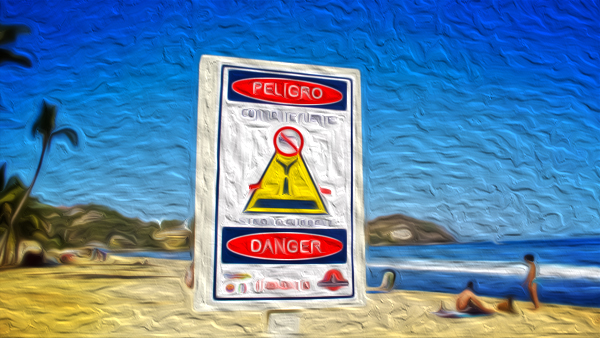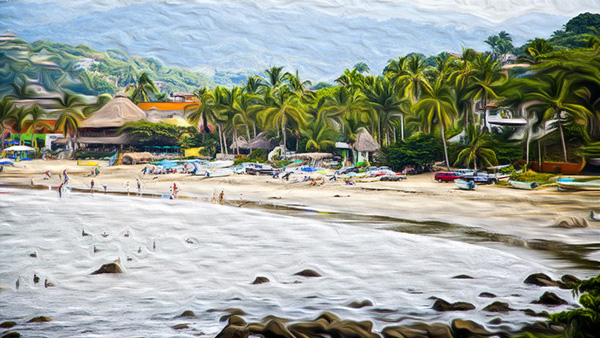With luggage in hand and a pair of surfboards in silver bags racked on the roof, Lucy, Teresa, and Marcia shared a cab to the airport early the next morning. They did the airport shuffle, boarded, and eventually took off. Marcia promptly passed out with her head glued to the window, leaving Teresa and Lucy to contemplate their young companion. “She looks wasted,” Terry said quietly.
“I know,” Lucy answered. “When I went to get her she was still unconscious. As was her sister. As were the two dudes with them.” She stopped. “It took me five minutes to shake her awake, and the boyfriend or whoever he was did not appear to be a happy little surf-puppy.”
“What do you mean?” Teresa said.
“There was some strange-looking paraphernalia on the stove and table,” Lucy said. “I don’t know the drug of choice these days but this looked like some demented child’s chemistry set.”
“Speed, I’ll bet,” said Teresa. “A lot of people are into it because its cheap and easy to make, and they say the rush is better than cocaine and lasts for days.” She looked grimly amused. “And best of all it destroys your brain faster than any other drug.”
“Jesus,” Lucy said. “What I have gotten us into? And my poor dog, for that matter. Marcia’s sister said she’d take care of him while I’m gone.”
“He’ll be OK. As will Marcia. They wouldn’t have been passed out if they were on a speed binge. Plus if they’re surfing every day they can’t be doing it that much. Your body just can’t take it. In any case, as far as our pal here goes, if speed is her demon of choice she probably won’t be able to get any down there. The whole concept of speed is completely anti-Mexican, unless you’re working for the cartel. She’ll have to dry out.”
“Hope you’re right,” Lucy said. She sighed. “At least I didn’t see any syringes.”
“Yeah. It’s not like we’re going to have time to babysit a fucked-up 23 year-old with a drug issue. We got TV to write, right?”
“Right,” said Lucy, happy to change the subject. “So that meeting was all well and good but do you really know what we’re going to do?”
“You’ve seen reality TV, right, Lucy?” She looked at her. Lucy looked back solemnly, then burst out laughing.
“Actually I did watch Survivor once,” she said. “And I’ve seen American Idol a couple of times.”
“That’s it?” Teresa asked, grinning. “Well, that means you’ve watched about two hours more reality TV than I have, Lucy. Bobby never even thought to ask, so intent was he on hiring me—us–but the truth is, I don’t even have a television.”
“I’d say that if we weren’t such literary geniuses we’d be in deep shit, Ter,” Lucy said. “But knowing that we are, in fact, obscure but authentic literary geniuses, we will simply create a masterwork of televisable reality. Out there amidst las olas altas.”
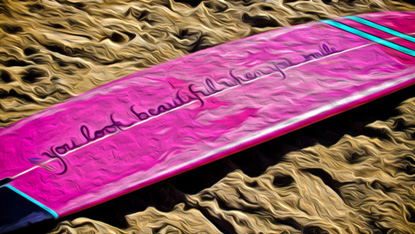
“No doubt, Chiquita,” Teresa answered. “Or get fired and go home.” Marcia stirred. “The dead live again,” Teresa exclaimed. “Stand back.” The girl shuddered, then went back to slack-jawed sleep. Now that she had a chance for an extended, upclose look at Marcia, Lucy didn’t like what she saw. A sallow sickliness suffused her skin. Her eyes wore raccoon rings. She looked worn way beyond 23 years.
But on the other hand the girl was smart, sexy and a hot surfer. Lucy knew her own enthusiasm had gotten her into this situation. She’d fallen for Marcia’s sense of style, in her flash car, on the beach, in the LA waves.
Lucy shook her worries off. “So tell me everything else you can think of about what we’re going to do with the show, Ter,” Lucy said.
“Well, to begin with, I think we gotta get some serious conflict going ASAP,” Terry said, whipping out a notebook. “Let’s take a meeting, Lucita.” They spent a couple of hours scheming X Dames plotlines involving shark attacks, Mexican-flavored beach parties leading to tequila-drunken catfights, collisions in the waves, international romantic intrigues, offshore diving adventures gone wrong, weird intestinal encounters with enchiladas, and other potential narrative thrills. Though it was tempting, they entertained and then dropped the idea of having Marcia’s apparent drug issues enter into the story. By the time they were closing in on Vallarta they had several pages of dramatically-enhanced reality mapped out around the surfing contest. And then with a swoop over the Bay of Banderas and a semi-circular maneuver to approach from over the mountains to the east, they landed with a single bounce—just enough to shake Marcia awake–followed by a smooth glide down the runway.
Twenty minutes later they found Sandra Darwin, a six-foot two-inch Amazon of a surfer girl, waiting amidst the gang of sign-waving hotel limo drivers and timeshare hustlers and other airport scammers outside customs. Sandra held a sign with Teresa’s name on it. Upon seeing her Lucy named her the Girl from Surfalita, cousin to the girl from Ipanema, for she was definitely tall and tan and young and lovely, except that at 27 years old Sandra Darwin was way too cut to be an entirely convincing bikini beach babe from Brazil or anywhere else. She wore shorts and a tank top and flip-flops, and had hard, ropy arms and legs. Though her blond-banged, blue-eyed face was pretty enough, she didn’t sport much in the way of curves, real or fake, in the usual places. What she sported was sinew and muscle. She looked like she could kick ass. “Hey girls,” she’d said when they approached, dragging boards and suitcases. “Who’s the surfer?”
“Me,” said a groggy Marcia. “I’m–”
“I’m gonna whip your booty in the contest, honey,” Sandra said, and then laughed. “Just kidding, kid.”
“Hey Sandra, how are you?” Terry said.
“You’re Teresa?” she asked.
“Yeah. Call me Terry. Or just Ter. Nice to meet in person at last, after all the email. And this is Lucy, and Marcia Hobgood, your competition.”
“Hey,” said Lucy. “How’s it going?”
“You’re the hotshot windsurfer, right?” said Sandra. “Did the Precolombian fake book?”
“Yes, that’s me. I get around out there,” Lucy said. “But I’m not–”
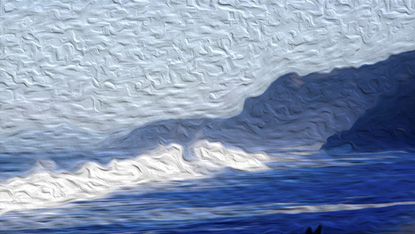
“I liked that book. Read it in a night. Let’s blow this joint,” Sandra said. “I hate airports.” She was an abrupt one, or maybe just a non-bullshitter. Nothing wrong with that, Lucy decided as they followed her out to a tank-sized white SUV, strapped the boards on the roof rack, and threw everything else in the back. They soon found themselves headed north on Highway 200.
“Beer and sodas in the cooler there. Help yourselves,” Sandra said a moment later into the rearview. Lucy handed Terry a ginger ale and had one herself.
Marcia cracked a Tecate, took a half-can swig, and said, “Aaah. I needed that.”
“I guess you did,” said Lucy, giving her a look. She gazed back inscrutably, her eyes circled by darkness, until Lucy looked away. “Hey Sandra, how long’s the ride?”
“Half an hour unless we get stuck behind a slow truck. The road gets pretty skinny and curvy once you get past the Punta Mita turn-off.” With mountains rising beyond a hazy valley to the east, and the Pacific to the west, they drove north through a landscape of scattered development, a classic colonized Mexican mingling of raggedy-ass little towns and ramshackle roadside retail buildings and massive American superstores and oversized bi-lingual billboards touting everything from Kahlua to Hummers, interspersed with golf courses, condo developments, hulking overscale hotels and timeshares along the shoreline to the west, and herds of horn-honking cars, trucks, buses, and motorcycles jockeying for position in the four-lane road. For fifteen minutes Sandra pointed out the sights and named the towns and turn-offs—Nuevo Vallarta, Mezcales, Bucerias, La Cruz de Huanacatle, Punta Mita–as they cruised along, paralleling the windy blue seas of Banderas Bay. Then they went through a checkpoint manned by a uniformed squad of what appeared to be sullen teenagers hefting submachine guns— Federales, Sandra said—and followed the light flow of traffic as two lanes on each side shrank to one and the road snaked into jungle-covered, hilly terrain.
Fifteen twisty minutes later they hit a flat, open stretch, where Sandra whipped a left past a brand new Pemex gas station and a Subway sandwich store and turned onto a newly-paved road. “They just did this road,” she said. “Used to be a potholed mess, back in the good old days,” she sighed. “But now–”
“What?” Teresa said.
“You’ve never been here, right? None of you?”
“I only go to New York,” Terry said. “This is my first time out of the USA.”
“I was in Mazatlan once,” Lucy said. “In college. Drunk for a week. And I’ve tripped through the Yucatan a few times, but that’s another world over there.”
“I went to Ensenada last year with some friends,” Marcia said. “We partied, and surfed, and partied and surfed some more, and then went home. It was cool.”
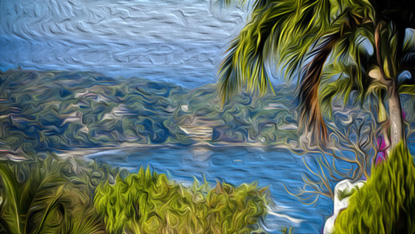
“Well, Sayulita was really cool,” Sandra said, as they turned right off new asphalt onto older asphalt, and dodged several potholes. “It used to be the perfect little Mexican beach town, but unfortunately it’s just too damn close to the PV aeropuerto. Which means that in the last few years it has gotten overrun with gringos of a different persuasion than the surfers, artists, and nomadic hippies that have always come here. Now there’s a bunch of rich guy houses on the hills and–don’t get me wrong, there have always been Americans and Canadians and even some Euros here, because it is a really cool town, with a nice beach, good fishing, and a fun surfing wave. But lately development has been happening way too fast.”
“Money does that,” said Lucy.
“Everywhere and always,” said Teresa.
“Yeah, I know,” Sandra said. “But I came down here a lot of years ago to surf and hang out, and then I got the Mexican branch of the Wave Divas off the ground and I never thought about buying property, even though it was still pretty cheap a few years back. And now all of a sudden everything is for sale, but without serious hustling and hassling buying anything is practically impossible. That’s why I gotta kick your booty in the contest, Marcia,” she said, and laughed mirthlessly. “I could use that X Dames dough. So if you turn here,” she said as she slowed and pointed to the right, “and go down there to the end of that road, Calle Miramar and turn right on the beach road, Palmar, you’re headed into the north end, where you’ll find your trophy haciendas on the hilltops. Downtown’s across the bridge just ahead. Along here you’ve got your roasted chicken stand, your paint store, your hardware store, hair salon, electric junk store, guy who does welding, car parts, bad art gallery, progressive private school for gringo kids–” They approached the bridge, and eased over. The river was a brown trickle flanked by mud banks. Beyond the downtown ahead they could see dozens of white or brightly colored Mediterranean-style houses scattered across the hillsides; between the established houses, half-built projects occupied much of the open land. “The river’s kind of scuzzy–a lot of sewage still goes in untreated, unfortunately, inspite of the new plant down by the beach, but the Mexicans have always done it that way, and when there were only a few hundred of them it didn’t hardly matter. Now there’s a few thousand Mexicans and gringos, and their shit stinks.
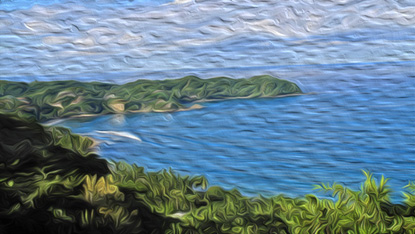
“But what the hell,” she went on, as they cranked a right. Ramshackle stalls housing craft vendors and food shops and plastic toys and kitchenware lined the riverbank on their right. “There’s a great swell right now and the surf is way large for Sayu, so the contest should be intense. Fantastic timing for the show.” She looked back at Marcia. “Are you ready, kid?”
“May I quote you?” said Marcia. “I’m gonna whip your booty.”
Sandra laughed. “We’ll see about that.” She turned left onto a dusty street lined with parked cars in front of small stores and houses behind foliage-covered walls. She drove two blocks and parked. “Here we are, girls: beautiful downtown Sayulita. The town plaza’s right there.” She pointed up the street. “Everybody hangs out there in the evenings.” She pointed the other way. “The beach is there, and the waves. You’re supposed to meet Ruben Dario, one of the X Dames producers, at El Costeno, the open air restaurant on the beach at the end of the street. I should warn you: some think Ruben’s the big bad wolf in this town, and he knows it. But the waves are right in front so you can check it out. I’ll take your stuff to the VR—it’s down the beach, you can’t miss it—and catch you later.”
“Cool,” said Lucy, climbing out. “The air’s nice here,” she said.
“It’s usually eighties by day, high sixties by night, until June. Then it gets stinky hot and sticky. Anyways you’re also scheduled to meet Bobby Schamberg and Judy and that whole gang at Bobby’s rental house, La Casa de la Luna Grande, on the beach at the north end of town, at seven o’clock for dinner. It’s about a half an hour’s walk from the hotel, or you can have them get you a taxi. Your stuff’ll be in your suite. See you then,” Sandra said. She drove off.
“Well here we are,” said Lucy, taking a look around. “Looks like a sweet little town.” Mexican and American hippies and surfers of all ages, girls in bikinis, sun-baked families, excited kids, barking and scrounging mongrel dogs, and dusty vehicles crowded the streets. Everything moved at a tropical crawl. It smelled of dogshit, fried fish, sunscreen, spilled beer, and the sea.
“Let’s go check out the waves,” said Marcia. “I gotta see what the surf’s like.”
They walked down the middle of the street, lined with two- and three-story buildings, ground floor tourist shops selling Mexican art, surfboards, bottled water, beer, clothes, groceries, and, in at least four different storefronts, REAL ESTATE. “She wasn’t kidding about the development, was she?” Lucy said. “It’s realtor hell.”
“I heard it’s because gringos can buy waterfront now without having a Mexican partner,” Teresa said. “You can get some kind of bank trust. Used to be foreigners couldn’t buy within a thousand meters of the beach. But now–” she shrugged. They all stared down the street and past all the clutter and out to sea. Where giant waves were crashing down.


